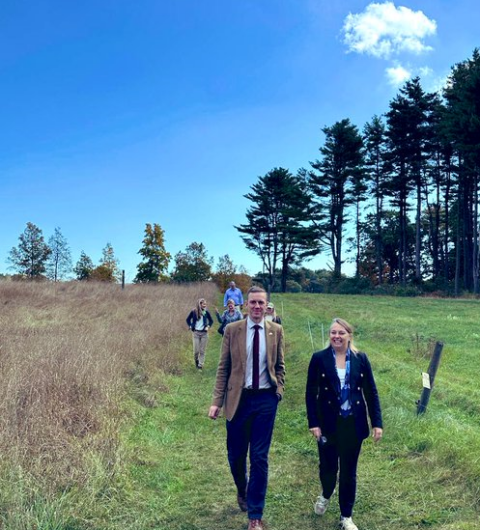Conservation in Scotland and New England:
Sharing Challenges and Seeking Solutions
Leading Land and Historic Property Trusts Seek Solutions Together

Last month, staff from the National Trust for Scotland and the Massachusetts-based conservation organization The Trustees met with colleagues from Historic New England and Minute Man National Historical Park to exchange ideas on climate resilience, sustainability, and strategies to engage new audiences at historic properties. The group, including National Trust for Scotland chief executive Phil Long and director of public engagement and research Michael Terwey, toured three of the Trustees’ iconic properties on the North Shore of Massachusetts—Crane Estate, Appleton Farms, and Long Hill—and discussed innovative solutions to preserving and sustain the treasured sites in their care.
“We know that the conservation challenges faced by the National Trust for Scotland are shared by our peers in New England,” said Kirstin Bridier, executive director of the National Trust for Scotland Foundation USA. “We are excited to share our strategies for drawing visitors and promoting green space for quiet recreation for the benefit of audiences in the UK and US.”
At the same time, The Trustees, the oldest nonprofit conservation organization in the United States, is leading efforts in climate resilience in Massachusetts. Earlier this year, the British Consulate in New England met with NTSUSA to discuss ways to bring innovative practices from Scotland to Massachusetts.

“The Crane Estate on the North Shore marries the rugged beauty of coastal Massachusetts with a majestic historic home and carefully restored public gardens all within a larger landscape. Just below the hillside, we are restoring the neighboring Great Marsh, the largest salt marsh in New England at over 20,000 acres, to mitigate coastal flooding from more intense storms as the climate changes,” said Katie Theoharides, President and CEO of The Trustees. “At nearby Appleton Farms, one of the oldest continuously operating farms in the country, we are committed to farming in ways that produce local, high-quality food while conserving biodiversity and wildlife habitat through our agroecology practices. These landscapes bring to life and connect generations of visitors to our mission: to protect special places for everyone forever.”
As the United States approaches 250 years as a nation, there is much to learn from Scotland about building a national brand around historic preservation and climate tourism.

“Addressing the climate and nature crisis is a priority for the UK, as the Foreign Secretary set out in his speech at Kew Gardens in September. I’m delighted to join this discussion of how the US and UK can protect our natural heritage for future generations and encourage young people to explore nature,” said David Clay MBE, the new British Consul General to New England. “There is a great opportunity for the UK and US to share expertise on innovative engineering and climate tech, which are key tools to ensure that some of our most beautiful places are sustainable and resilient in the face of climate change.”
This inaugural gathering between NTS and NTSUSA, The Trustees, and other American historic properties, National Parks, and land trusts is a crucial first step toward greater knowledge exchange and collaboration between Scotland and New England, ensuring that these treasured landscapes are protected for future generations.
